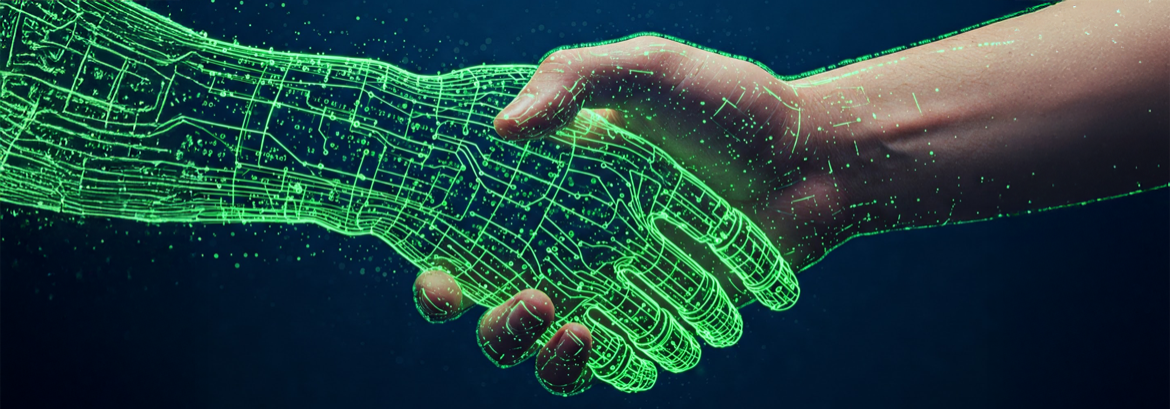
Do you remember rush-hour traffic and coffee breaks in the lunchroom? In a few short years, the concept of “going to work” has undergone a radical transformation. Before 2019, you may have had to sleep at a reasonable time so you could wake up early and begin your commute to school or work. You may have had to prep a bag, lunch, and set a coffee maker and follow a routine as you started the week. Ever since the pandemic, things have changed. For some, remote work made traffic and preparing meals a thing of the past. According to StatsCan, in 2019, 4 in 10 Canadian jobs could have been done from home. Ten years ago, working from home while earning a salary with benefits may have seemed like fiction, but here we are. Just as we’ve settled into home offices, another shift has begun.
Once again, the workplace is undergoing a transformation, but this time change is being driven by technology. Today, AI can draft emails, design images and social media posts, create music, review tasks and we can incorporate suggestions to enhance the final product. Artificial intelligence is revolutionizing our work processes, our interactions, and even our lifestyles. While some fear job displacement, others see the possibilities. The potential of AI is immense, and while it's still in its early stages, it's a fascinating glimpse into the future of work.
 All images in this blog were generated with Google Gemini
All images in this blog were generated with Google Gemini
In marketing, change is constant, and the workplace has changed. As technology advances, it will only continue to do so. If your company hasn't implemented AI yet, you might be curious about how it works, what it can do, how it can help, or if it could make you more efficient. Your employer may encourage you to use AI to simplify your duties, but it's still a work in progress. Netflix uses AI to personalize the experience for each user, by curating content based on the users’ viewing habits. Amazon uses AI in many ways from the digital voice assistant Alexa, to using predictive analytics to anticipate shipping items based on users buying habits.
In a sense, AI is like a Swiss Army knife, it can do a lot of things, but still needs a skilled hand to guide it. Implementing AI is a huge step forward for technology, and it’s already changing how we work. It may only be a matter of time before it changes how everyone works. According to Forbes’ 24 Top AI Statistics and Trends In 2024, one of the statistics says, AI is projected to create somewhere around 97 million jobs, however, another statistic in the same article says, 400 million workers (15% of the global workforce) could be displaced because of AI.
 All images in this blog were generated with Google Gemini
All images in this blog were generated with Google Gemini
As you prepare to break into the marketing world, equipping yourself with the right tools can be a game-changer. Our panelists from our Fall CMA NXT Marketing Careers Night shared some of their favourite tools being ChatGPT as their brainstorming buddy, HubSpot for personalized marketing campaigns, Canva’s AI-powered design suggestions, and Hootsuite Insights for AI social media messaging. Mastering these types of tools can elevate your productivity and creativity, providing a competitive edge in the marketing field.
We've gone from office cubicles to home offices, and now we're on the brink of an AI revolution. This shift promises both opportunities and challenges. As marketers, our success will hinge on how we adapt to and harness AI's power. The future isn't just about AI's capabilities, but how we evolve alongside it, leveraging our uniquely human traits of creativity and strategic thinking. The question isn't just what work will look like in the AI era, but how we'll shape it.
Prepare for your marketing career by staying connected with the latest networking events, educational videos, and insightful content. Subscribe to CMA NXT to ensure you have access to the resources you need to thrive in the dynamic field of marketing.

As you look at your phone, you realize that while you're still not sure which one is right for you in the moment, one thing's for sure: you like the idea of being valued for the knowledge you bring. After all, as Francis Bacon once said, "Knowledge is power."

From Old Spice's "I'm a man on a horse" to Connor starring in the Georgetown Hospital Foundation video known as "Lottery girl," Connor discusses how unhinged ideas could become a major success for your brand.

Marketing case competitions will exceed your expectations and open doors you never knew you wanted to walk through. You can become a better marketer by taking a chance now. What are you waiting for?